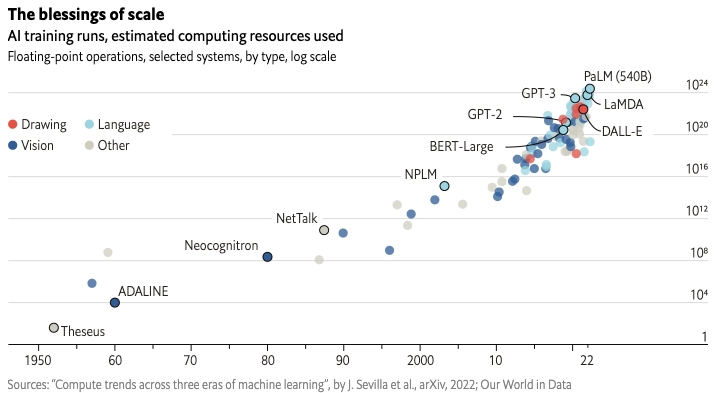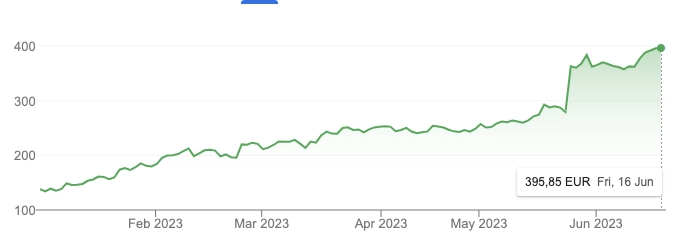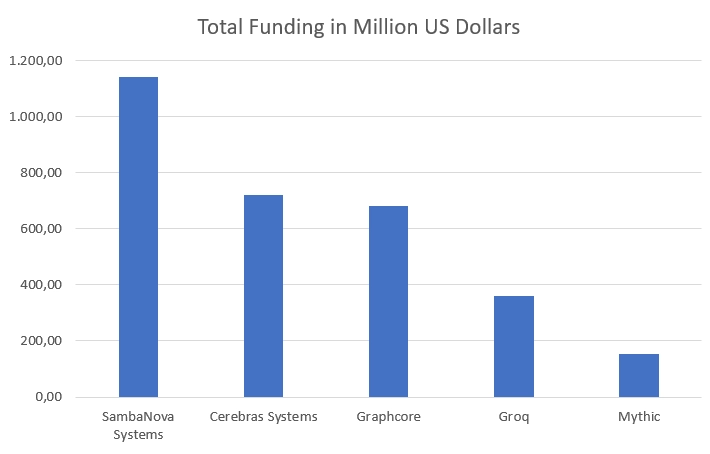By Cem Dilmegani

As the figure above illustrates, the number of parameters (consequently the width and depth) of the neural networks increase, which indicates greater model size. To derive meaningful results from existing deep learning models, organizations require increased computing power and memory bandwidth.
Powerful general-purpose chips (such as CPUs) cannot support such sophisticated deep learning models. Therefore, AI chips that enable parallel computing capabilities are increasingly in demand, and according to McKinsey, this trend will continue.
However, even Intel, which has numerous world-class engineers and a strong research background, needed three years of work to develop its own AI chip. Therefore, for most companies, buying chips or platforms that run on a purpose built AI chip, from these vendors is the only way to develop powerful deep learning models. This article will introduce 10 AI chip vendors to help companies choose the right one.
Who are the leading AI chip producers?1. Nvidia
Nvidia has been producing graphics processing units (GPUs) for the gaming sector since 1990s. The PlayStation 3 and Xbox both use Nvidia graphics arrays. The company also makes AI chips such as Volta, Xavier, and Tesla. Thanks to the generative AI boom, NVIDIA had excellent results in Q2 2023 and reached a trillion in valuation.
NVIDIA’s chipsets are designed to solve business problems in various industries. Xavier, for example, is the basis for an autonomous driving solution, while Volta is aimed at data centers. DGX™ A100 is the flagship AI chip of Nvidia which is also designed for data centers. Product integrates 8 GPUs and up to 640GB GPU memory. Nvidia Grace is the new AI chip model that the company released for the HPC market in 2023.
For AI workloads on the cloud, Nvidia almost has a monopoly with most cloud players offering Nvidia GPUs as cloud GPUs.
2. IntelIntel is one of the largest players in the market and has a long history of technology development. In 2017, Intel became the first AI chip company in the world to break the $1 billion sales barrier.
Intel’s Xeon processors, which are appropriate for a variety of jobs, including processing in data centers, have had an impact on the company’s commercial success. In comparison to earlier generations, the third generation Xeon platinum series has up to 40 cores and 1.6 times greater memory bandwidth, and 2.66 times greater memory capacity compared to previous generation.
Gaudi is the neural network training accelerator from Intel. This product is able to scale as models get larger and has a relatively low total cost of ownership. For inferencing, Intel has the Goya, optimized for throughput and latency.
Intel® NCS2 is the latest AI chip from Intel and was developed specifically for deep learning.
3. Google AlphabetGoogle Cloud TPU is the purpose-built machine learning accelerator chip that powers Google products like Translate, Photos, Search, Assistant, and Gmail. It can be used via the Google Cloud implementation. Edge TPU, another accelerator chip from Google Alphabet, is smaller than a one-cent coin and is designed for edge devices such as smartphones, tablets, and IoT devices.
4. Advanced Micro Devices (AMD)AMD is a chip manufacturer that has CPU, GPU and AI accelerator products. For instance, AMD’s Alveo U50 data center accelerator card has 50 billion transistors. Accelerator can run 10 million embedding datasets and perform graph algorithms in milliseconds.
AMD launched MI300 for AI training workloads in June 2023 and will be competing with NVIDIA for marketshare in that market.1
5. IBMIBM launched its “neuromorphic chip” TrueNorth AI in 2014. TrueNorth contains 5.4 billion transistors, 1 million neurons, and 256 million synapses, so it can efficiently perform deep network inference and deliver high-quality data interpretation.
In April 2022, IBM launched its new hardware, “IBM Telum Processor”. Its development process took three years and is aimed to improve efficiency of use of large datasets. According to IBM, it is suitable to use Telum processors for missions such as preventing fraud immediately due to its improved processor core and memory compared to previous AI chips of the company.
The below video further introduces Telum Processor:
https://www.youtube.com/watch?v=TRBgBbvYiQwWho are the leading AI chip startups?We would also like to introduce some startups in the AI chip industry whose names we may hear more often in the near future. Even though these companies were founded only recently, they have already raised millions of dollars.
 6. SambaNova Systems
6. SambaNova SystemsSambaNova Systems was founded in 2017 with the goal of developing high-performance, high-precision hardware-software systems. The company has developed the SN10 processor chip and raised more than $1.1 billion in funding.
It is important to note that, rather than selling its AI processors, SambaNova Systems builds data centers and leases them to the businesses. Product as service approach of SabaNova Systems might enhance product stewardship and force them to produce more durable products since they own it through the lifecycle. AIMultiple evaluates product as service approach as one of the circular economy best practices.
7. Cerebras SystemsCerebras Systems was founded in 2015. In April 2021, the company announced its new AI chip model, Cerebras WSE-2, which has 850,000 cores and 2.6 trillion transistors. Undoubtedly, the WSE-2 is a big improvement over the WSE-1, which has 1.2 trillion transistors and 400,000 processing cores.
Celebra’s system works with many pharmaceutical companies such as AstraZeneca and GlaxoSmithKline because the effective technology of WSE-1 accelerates genetic and genomic research and shortens the time for drug discovery.
8. GraphcoreGraphcore is a British company founded in 2016. The company announced its flagship AI chip as IPU-POD256. Graphcore has already been funded with around $700 million.
Company has strategic partnerships between data storage corporations like DDN, Pure Storage and Vast Data. Graphcore works with research institutes around the globe like Oxford-Man Institute of Quantitative Finance, University of Bristol and Berkeley University of California are other reputable research organizations that use Graphcore’s AI chips.
9. GroqGroq has been founded by former Google employees. The company represents a new model for AI chip architecture that aims to make it easier for companies to adopt their systems. The startup has already raised around $350 million and produced its first models such as GroqChip™ Processor, GroqCard™ Accelerator, etc.
On the first of March, Groq acquired Maxeler, which has high performance computing (HPC) solutions for financial services applications.
10. MythicMythic was founded in 2012. It developed products such as M1076 AMP, MM1076 key card, etc., and has already raised about $150 million in funding.
Source: research
Original Content:
https://research.aimultiple.com/ai-chip-makers/